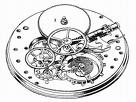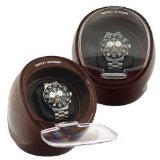
By D. J. McAdam.
When I was a young man, part of my daily morning ritual was the winding of my wristwatch. It wasn't a big deal, and I never sat around sighing, "Oh, if only I didn't have to wind my watch everyday," in some wistful fashion. If I forgot to wind my watch, which was rare, the watch stopped running, and then I had to reset the time and wind the watch.
At some point, like most men, I switched from watches one had to wind every day - now called watches with manual movements, or mechanical watches - to watches that ran on a battery, which are called watches with quartz movements. I never owned one of those watches that were self-winding, called automatic watches, but I'd heard of them.
None of this information about watch movements occupied any great portion of my brain, because for a long time I simply didn't care. I wore cheap watches, for the very practical reason that a person as naturally careless as myself would at some point misplace his watch, and it is always better to lose a cheap watch than an expensive one.
I haven't suddenly become less careless, or so wealthy that the loss of an expensive watch wouldn't bother me, but there are now many good deals on wristwatches, so that some watches I would previously have deemed too expensive are now priced on sale at a point where I feel comfortable purchasing one. Plus, I'm older, and it's nice to have a decent-looking watch for dress occasions. So, I started shopping online for a watch, and that's when the need to know about watch movements really established itself. Having done a somewhat decent amount of study on the subject, I'm happy to share what I've learned.
As alluded to above, here are the major type of watch movements one is likely to encounter:
So, what's best?
The most affordable watches are all quartz watches, which run on batteries. You can find these for as little as ten bucks, but there are nice watches costing a thousand dollars or more that are battery watches. This is the easiest watch to own, since it requires no winding, very little maintenance, and is usually quite accurate. The downside is that quartz watches do require battery replacements. A quartz watch will stop working when the battery dies, and it doesn't care whether you're on safari in Kenya or about to give an important business presentation.
Mechanical or automatic watches sound like a lot of work compared to quartz watches, but really, what's so hard about winding a watch every day (in the case of a mechanical watch), or every once in a while (in the case of an automatic watch)? These watches do have intricate parts - if you're the kind of person who admires such things - and don't ever have to have batteries replaced, because there are no batteries.
 From a slightly frivolous point of view, automatic watches in turn justify the
purchase of a watch winder, which will keep the watch moving when it's not on
your arm.
From a slightly frivolous point of view, automatic watches in turn justify the
purchase of a watch winder, which will keep the watch moving when it's not on
your arm.
The result of all my research is that I am no longer afraid of watches that have manual or automatic movements. Yes, they're more work than quartz watches, but they also have some inherent advantages, and many interesting styles of watches I've seen recently have automatic or manual movements. If, in the future, I really want a watch based on its appearance, and it is a manual or self-winding watch, I'll purchase it. This time around, though, I found a very nice Invicta watch with a quartz movement, and so far I'm quite pleased with my purchase.
*******
See also: I Replace a Watch Battery
Copyright © D. J. McAdam· All Rights Reserved